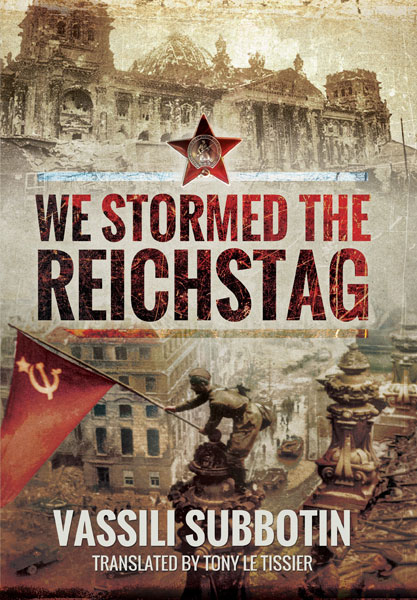| Title: | We Stormed the Reichstag |
| Subtitle: | A War Correspondent Remembers |
| Author | Vassili J. Subbotin |
| Publisher: | Pen & Sword |
| Published: | 2017 |
| Pages: | 139 |
| Language | English |
| ISBN: | 978-1-47387-775-7 |
| Review: |
During the Second World War, many war correspondents travelled with the Red Army. Famous war newspapers such as Krasnaya Zvezda employed a number of big names in the industry, such as Konstantin Simov, Vasily Grossman and Aleksei Tolstoi, but also a number of smaller division newspapers had access to writing talent. One of them was the not very well-known Vasily Subbotin, barely twenty years old, who during the war first was a tank marksman – with an officer’s rank – and later started to write for a division newspaper. In 1965 Subbotin wrote down his memoires under the title How Wars End. A couple of years later the book was translated into German and it is now also available in English. Subbotin was affiliated to the 150th Infantry Division, which took part in the Battle for Berlin. As part of the 3rd Shock Army, the division entered the city from the northeast, and was the first which crossed the Moltke bridge over the river Spree, just a couple of hundred metres distance from the Reichstag Building. It then took them one more day to reach the Königsplatz in front of the Reichstag. During April the 30th several smaller groups of soldiers entered the Reichstag Building, and later that evening the red Soviet banner was hoisted up the roof. Subbotin was a witness to the siege and made it his main theme in his memoires. Subbotins book is, so it seems, based on notes he took during the war. After the war, Subbotin visited Berlin again, and was able to meet up with some of his former brothers in arms and published his work. The book contains many chapters with often short titles. Many chapters have only 1-2 pages and sometimes consist of only half a page. Although the storming of the Reichstag is the main theme, also other subjects are dealt with, for example earlier war experiences or post-war episodes. Besides the combat action, there is lots of room for the day-to-day worries of the front soldiers and the often underexposed 'fog of war' which mostly the lower officers had to deal with. At times, the whole becomes a bit incoherent, because he jumps from one subject to another, but overall, Subbotins’ writing style is easy to follow and pleasant. He also makes use of many quotes from fellow soldiers. All in all the story is easy to follow. Finally I have to say something about the translation. To my knowledge, the translator Le Tissier speaks no Russian. During his career he translated many German books, and in this case too, it seems as though he used a German text as source text for the translation, namely the translation of Heinz Kübart from 1969, which is also evident from the used German title and spelling of the Russian names. That is a strange and unusual choice for a (semi) literary work. The German translator allowed himself many literary freedom and although Le Tissier followed the German translation quite meticulously, he regularly also allowed himself poetic freedom, as a result of which the end result only barely resembles the original Russian work of Subbotin. When we compare the three versions, it’s clearly evident that Kübart many times opted to remove complete sentences, add parts of sentences and even came up with new chapters. Le Tissier follows this course, probably because he’s not quite sure how to deal with the structure of the original book. We had to read the translation, because we can’t read Russian and therefore trust the translator to have translated the book as accurate as possible, but this trust is somewhat damaged when it turned out that the translator never took knowledge of the original work. Le Tissier camouflaged this by simply not stating which version he end up translating. This is a bad thing, but fortunately, the identity of the book – a catchy, easy reading eye witness account of a special campaign – is maintained. |
| Rating: | |
Information
- Translated by:
- STIWOT translator
- Article by:
- Auke de Vlieger
- Published on:
- 03-09-2017
- Feedback?
- Send it!




